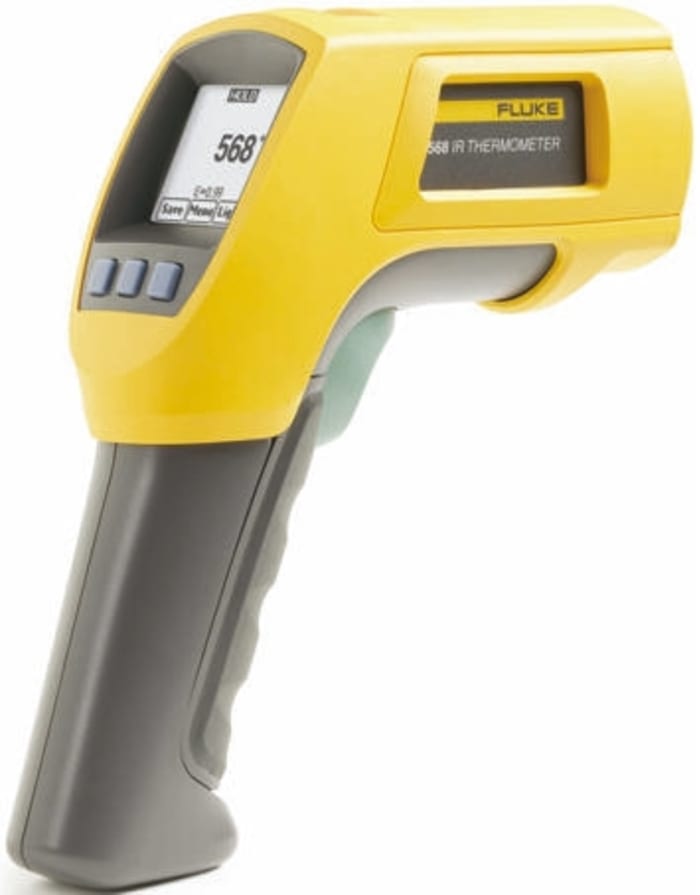Technical Document
Specifications
Brand
FlukeAbsolute Maximum Temperature Measurement
+760°C
Temperature Scale
Centigrade, Fahrenheit
Calibrated
RSCAL
Absolute Minimum Temperature Measurement
-32°C
Best Accuracy
±1 °C
Distance to spot Ratio
50:1
Emissivity
0.1 → 1
Model Number p
68
Resolution
0.1 °C
Data Storage
Yes
Response Time
0.5 s
Length
200mm
Width
160mm
Height
55mm
Dimensions
200 x 160 x 55mm
Weight
320g
Product details
Fluke 63 Infrared Thermometer
An ideal solution for non-contact temperature measurements, the 63 infrared thermometer has a wide variety of applications. Monitor the status of electrical motors, electric panels, research and troubleshoot ventilation and heating and much more. Fluke 63 is a handheld portable tool, single dot laser sighting guides users to the right target for measurements and can take readings in less than a second.
Accurate readings from a temperature range of -40°C to 760°C (-40 °F to 1400 °F), this infrared laser thermometer is excellent for hard to reach, rotating, hot or dangerous situations. Additional features include, Min/Max/Avg/Dif readings, data logging up to 12 points and Hi/Low alarms.
Features and Benefits:
• Laser guide
• Back-lit display
• 0.95 emissivity
• Selectable °C or °F
• Expanded measurement range up to 535 °C (999 °F)
• High accuracy: 1 % and repeatability: 0.5 %
FAQ's
Are infrared thermometers dangerous?
IR thermometers are not harmful, they do not emit radiation, only measure it like a digital camera.
How accurate are infrared thermometers?
The majority of IR thermometers have a measurement error specification, which shows their best accuracy. The surface being measured can also affect accuracy. Reflective objects result in lower measurements than the actual temperature, whilst non-reflective surfaces give higher measurement. The emissivity of a surface is how effective it is at emitting energy as thermal radiation, as such some IR thermometers have adjustable emissivity settings.
Distance to spot ratio is also essential in providing accurate temperature measurements, if an infrared thermometer is too close to its target area, heat can build up in the device. This can give false readings or damage the temperature sensors, therefore it is essential to always follow a manufacturers guidelines.
Supplied with
Durable hard case; 9V alkaline battery; operating instructions.
P.O.A.
1
P.O.A.
Stock information temporarily unavailable.
1
Stock information temporarily unavailable.
Technical Document
Specifications
Brand
FlukeAbsolute Maximum Temperature Measurement
+760°C
Temperature Scale
Centigrade, Fahrenheit
Calibrated
RSCAL
Absolute Minimum Temperature Measurement
-32°C
Best Accuracy
±1 °C
Distance to spot Ratio
50:1
Emissivity
0.1 → 1
Model Number p
68
Resolution
0.1 °C
Data Storage
Yes
Response Time
0.5 s
Length
200mm
Width
160mm
Height
55mm
Dimensions
200 x 160 x 55mm
Weight
320g
Product details
Fluke 63 Infrared Thermometer
An ideal solution for non-contact temperature measurements, the 63 infrared thermometer has a wide variety of applications. Monitor the status of electrical motors, electric panels, research and troubleshoot ventilation and heating and much more. Fluke 63 is a handheld portable tool, single dot laser sighting guides users to the right target for measurements and can take readings in less than a second.
Accurate readings from a temperature range of -40°C to 760°C (-40 °F to 1400 °F), this infrared laser thermometer is excellent for hard to reach, rotating, hot or dangerous situations. Additional features include, Min/Max/Avg/Dif readings, data logging up to 12 points and Hi/Low alarms.
Features and Benefits:
• Laser guide
• Back-lit display
• 0.95 emissivity
• Selectable °C or °F
• Expanded measurement range up to 535 °C (999 °F)
• High accuracy: 1 % and repeatability: 0.5 %
FAQ's
Are infrared thermometers dangerous?
IR thermometers are not harmful, they do not emit radiation, only measure it like a digital camera.
How accurate are infrared thermometers?
The majority of IR thermometers have a measurement error specification, which shows their best accuracy. The surface being measured can also affect accuracy. Reflective objects result in lower measurements than the actual temperature, whilst non-reflective surfaces give higher measurement. The emissivity of a surface is how effective it is at emitting energy as thermal radiation, as such some IR thermometers have adjustable emissivity settings.
Distance to spot ratio is also essential in providing accurate temperature measurements, if an infrared thermometer is too close to its target area, heat can build up in the device. This can give false readings or damage the temperature sensors, therefore it is essential to always follow a manufacturers guidelines.
Supplied with
Durable hard case; 9V alkaline battery; operating instructions.

